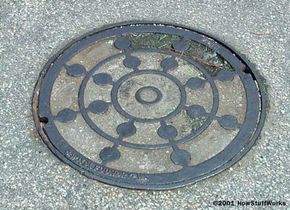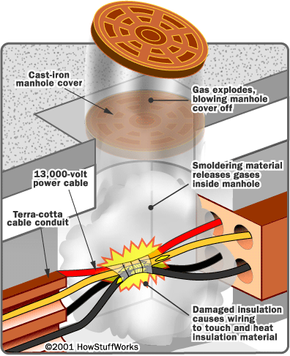We don't often realize how much untapped energy exists all around us. The principle behind these manhole explosions is similar to how a car engine works. Imagine a city-sized engine with pistons as big as buildings. In this analogy, the manholes are the combustion chambers of the engine and the electrical lines are the spark plugs. These powerful manhole explosions could theoretically power the city if they happened often enough.
There's a very basic principle behind any reciprocating internal-combustion engine: If you put a tiny amount of high-energy fuel (like gasoline) in a small, enclosed space, and ignite it, an incredible amount of energy is released in the form of expanding gas.
To understand this, you need to understand the basic process of an internal-combustion engine. Here's what happens as the engine goes through its cycle:
- Intake stroke - The piston starts at the top, the intake valve opens and the piston moves downward to let air and gasoline into the cylinder. Only the tiniest drop of gasoline needs to be mixed into the air for this to work.
- Compression stroke - The piston moves back upward to compress this fuel/air mixture. Compression makes the explosion more powerful.
- Combustion stroke - When the piston reaches the top of its stroke, the spark plug emits a spark to ignite the gasoline. The gasoline charge in the cylinder explodes, driving the piston downward.
- Exhaust stroke - Once the piston hits the bottom of its stroke, the exhaust valve opens and the exhaust leaves the cylinder to exit through the tail pipe.
The manholes in question are already filled with an expanding gas, and any spark is going to expand it further. In a combustion engine, the explosion causes the gas to push up on a piston. In a manhole, the explosion pops the heavy manhole cover right out of the ground.
If it were possible to situate a piston over an exploding manhole, you might be able to use the power to turn a crankshaft. Each explosion would release enough force to push the piston. And if you connected the crankshaft to a generator, and explosions occurred frequently enough, you could tap the energy of these mishaps to supply power to the residents of an entire city!


